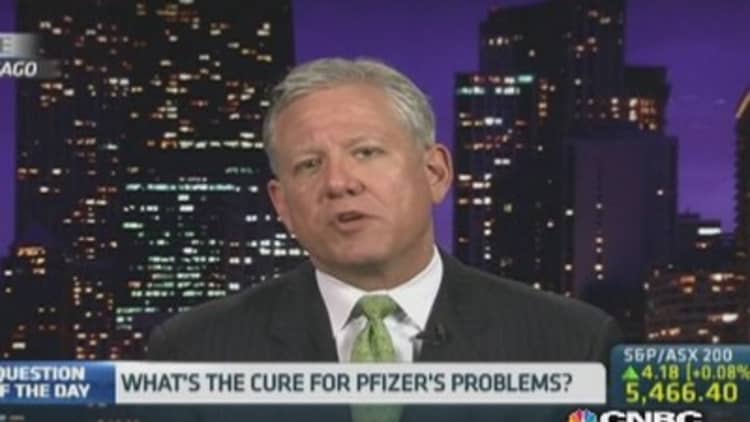Pfizer's attempt to escape the United States corporate tax rate by acquiring a British drug maker has set off a flurry of activity within other big companies across the country, at investment banks on Wall Street and in offices on Capitol Hill.
Pfizer has offered to buy AstraZeneca for $106 billion. If the deal is successful, Pfizer would become an English company, reducing its tax bill at least $1 billion a year.
The promise of such savings has many other big corporations seriously evaluating whether they, too, could reincorporate overseas. Walgreen is already under pressure from hedge fund investors that want it to move across the Atlantic.
In New York, investment bankers and lawyers are urging clients to act quickly if they are serious about such a move, knowing that rules could change soon. In Washington, lawmakers have started to examine what legislation could be drafted to stop the outflow of tax dollars.
Senator Carl Levin, Democrat of Michigan, on Thursday became the latest lawmaker to call for an end to so-called inversions, the deals through which United States companies acquire an overseas competitor and reincorporate abroad. He said he planned to introduce a bill to curb the practice. That could happen as early as next week, according to people briefed on the matter.
More from the New York Times:
A case for rejecting Pfizer's bid for AstraZeneca
How tax laws distort the Pfizer deal
End corporate taxation
"It's become increasingly clear that a loophole in our tax laws allowing these inversions threatens to devastate federal tax receipts," he said in a statement. "We have to close that loophole."
Any new laws are unlikely to arrive before more big companies move abroad.
At a meeting in Paris last month, Walgreen investors, including the hedge funds Jana Partners, Corvex and Goldman Sachs Investment Partners, encouraged the company's management to consider an inversion, which would probably take place through an acquisition of Alliance Boots, a British drugstore chain in which Walgreen holds a 45 percent stake.

Walgreen's executives resisted the idea at first, concerned that the political cost would outweigh any tax savings.
But Pfizer's audacious proposal to acquire AstraZeneca opened the door for other companies to consider what was until recently viewed as a risky move. Now, Walgreen's management has begun to come around, people briefed on the matter said.
"We are aware of all the inversions that are happening and certainly all of that is being investigated," Rick J. Hans, Walgreen's divisional vice president for investor relations and finance, said on a call with analysts just days after Pfizer announced its plans. "We're not averse to looking at it," he said. "We've never been a proponent to pay more taxes than we have to."
Read MorePfizer-AZ sparks protectionist sound and fury
Political pressure to address the tax maneuver has grown in recent years as dozens of companies have bought foreign rivals and moved their headquarters to countries with lower tax rates, reducing revenue to the Treasury.
But inversions were thrust into the spotlight last week, when Pfizer became the largest and best-known company to try to essentially renounce its American citizenship.
Mr. Levin said companies that moved overseas were unfairly taking advantage of many of the benefits of doing business in the United States but not paying their fair share of taxes.

Those benefits, he said, include "patent protection, research and development tax credits, national security and more." He added, "They shouldn't be allowed to shift their tax burden onto others."
Though laws have changed over the years to make inversions more difficult, they remain relatively easy to accomplish when done as part of an acquisition of a foreign company.
"It's unfair to criticize companies that do inversion when we live in this very complicated world," said a lawyer at a top law firm who has advised on inversions but spoke on the condition of anonymity because he was not authorized to comment publicly. "All companies should pay their fair share, but I'm not sure that companies that are inverted don't do so."
A number of pharmaceutical companies have set up in countries with low corporate tax rates, particularly Ireland and the Netherlands. Technology companies, industrial manufacturers and the banana producer Chiquita have also announced deals that would let them move abroad, substantially cutting their United States tax bills.
Warren E. Buffett, the chairman and chief executive of Berkshire Hathaway, said on Monday that his company was unlikely to ever move abroad, despite sometimes feeling at a disadvantage because of competitors' lower tax rates.
"We do not feel that we are unduly burdened by federal income taxes," Mr. Buffett said on CNBC. "But it does get a little annoying to us when we see other people paying far lower tax rates while engaging in the same sort of business that we engage in."
Read MoreAstraZeneca's new attempt to foil Pfizer's plans
Yet in the wake of Pfizer's efforts, Mr. Buffett said he thought legislation would be coming soon.
"My guess is that when you get to companies of this size, this prominence, and with this speedup of momentum, my guess is that Congress one way or another addresses this," he said. "Whether they just try to work on this little aspect of the code that allows this, which is not insignificant, or whether that forces them to rethink sort of all corporate taxes, we'll find out. But I do think it's going to get attention."
In addition to Mr. Levin, other lawmakers have called for efforts to curb inversions in recent months. Senator Max Baucus, Democrat of Montana and a former chairman of the Senate Finance Committee, introduced legislation that would have limited inversions before he became ambassador to China. And the budget President Obama submitted to Congress included language intended to end them. Neither effort has gotten far.
Pfizer said on Thursday that it was open to changes in the corporate tax code but wanted to make sure United States companies remained competitive.
"We expect the comprehensive tax-reform debate to continue, and we are actively engaged in the debate," it said. "Pfizer supports comprehensive tax reform that enhances the global competitiveness of U.S.-based companies operating internationally."
Follow us on Twitter: @CNBCWorld

